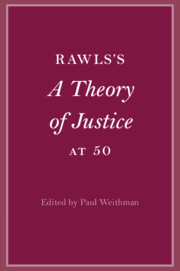Book contents
- Rawls’s A Theory of Justice at 50
- Cambridge Philosophical Anniversaries
- Rawls’s A Theory of Justice at 50
- Copyright page
- Dedication
- Contents
- Figures
- Contributors
- Acknowledgments
- Abbreviations of and Bibliographic Information for Rawls’s Works
- Introduction
- Part I Rawls and History
- Part II Developments between A Theory of Justice and Political Liberalism
- Part III Rawls, Ideal Theory, and the Persistence of Injustice
- Part IV Pluralism, Democracy, and the Future of Justice as Fairness
- 14 Public Reason at Fifty
- 15 Reasonable Political Conceptions and the Well-Ordered Liberal Society
- 16 Religious Pluralism and Social Unions
- 17 One Person, at Least One Vote?
- 18 Reflections on Democracy’s Fragility
- 19 A Society of Self-Respect
- References
- Index
15 - Reasonable Political Conceptions and the Well-Ordered Liberal Society
from Part IV - Pluralism, Democracy, and the Future of Justice as Fairness
Published online by Cambridge University Press: 20 July 2023
- Rawls’s A Theory of Justice at 50
- Cambridge Philosophical Anniversaries
- Rawls’s A Theory of Justice at 50
- Copyright page
- Dedication
- Contents
- Figures
- Contributors
- Acknowledgments
- Abbreviations of and Bibliographic Information for Rawls’s Works
- Introduction
- Part I Rawls and History
- Part II Developments between A Theory of Justice and Political Liberalism
- Part III Rawls, Ideal Theory, and the Persistence of Injustice
- Part IV Pluralism, Democracy, and the Future of Justice as Fairness
- 14 Public Reason at Fifty
- 15 Reasonable Political Conceptions and the Well-Ordered Liberal Society
- 16 Religious Pluralism and Social Unions
- 17 One Person, at Least One Vote?
- 18 Reflections on Democracy’s Fragility
- 19 A Society of Self-Respect
- References
- Index
Summary
Rawls introduces the idea of a well-ordered liberal society in the 1996 introduction to Political Liberalism. A liberal society is well-ordered when governed by one or another reasonable liberal political conception. Rawls says: “political liberalism is to be understood as a freestanding family of reasonable liberal political conceptions.” I discuss the main features of reasonable liberal conceptions within well-ordered liberal societies, and the centrality of the criterion of reciprocity. Liberal conceptions are not reasonable if they fail to impose any formal restrictions on permissible inequalities or fail to limit the effects of wealth on democratic politics. This includes not only libertarianism but also a wide range of classical and neo-liberal positions. None of these are reasonable according to Rawls’s criterion of reciprocity, and none satisfy his liberal principle of political legitimacy, since all permit and even encourage unrestricted inequalities and individuals’ unlimited accumulation of wealth and economic powers.
Keywords
- Type
- Chapter
- Information
- Rawls’s A Theory of Justice at 50 , pp. 257 - 276Publisher: Cambridge University PressPrint publication year: 2023
- 1
- Cited by

